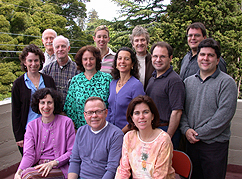Berkeleyan
'Transforming the teaching and learning environment'
Imparting tech expertise, and sharing lessons learned, are among the agenda items for the second e-Berkeley Symposium
![]()
| 17 March 2005
Incorporating technology into a course doesn't require a wholesale overhaul. That's just one of the messages the organizers of the second e-Berkeley Symposium hope to impart to faculty who attend the April 12 conference.
| eBerkeley symposium information The second e-Berkeley Symposium, "From Information Overload to Information Rich: Teaching and Critical Thinking in the Point-and-Click Age," will take place on Tuesday, April 12, on the Clark Kerr Campus. Co-sponsored by the e-Berkeley program, the Library, the Division of Undergraduate Education, and the Berkeley Division of the Academic Senate, the symposium is open to faculty, staff, and students. For a program and schedule, or to register for the symposium, visit the e-berkeley website. The registration deadline is Tuesday, March 22. |
"The Berkeley campus is full of talented instructors and academic support partners who are transforming the teaching and learning environment," says Vice Provost for Undergraduate Education Christina Maslach. "The e-Berkeley Symposium gives us a wonderful forum for sharing this expertise and exploring ways to scale up innovation across the campus."
The morning session will include a panel discussion on the symposium's theme, followed by discussions of research-based learning and by small-group explorations of creative and effective ways to engage students by integrating research skills into the classroom and the curriculum.
Also on the a.m. docket will be a report on lessons learned by participants in the initial Mellon Faculty Institute for Undergraduate Research. The summer program featured a cross-disciplinary group of faculty who created or redesigned courses in order to assist undergraduates in developing information-literacy and research skills.
 These faculty members integrated technology and research-based multimedia projects into the course redesigns they undertook during the 2003-04 Mellon Library/Faculty Fellowship for Undergraduate Research. (Kim Steinbacher photo) |
Less paperwork = innovations in teaching
"We're looking at technology to determine how it can help the campus meet its educational goals," says e-Berkeley director Jon Conhaim, one of the symposium's organizers. One way of doing so, he says, is to streamline the faculty's administrative tasks, freeing them up to develop innovative new teaching practices. An online grade book, now being developed by the campus, was a key recommendation that came out of the last e-Berkeley symposium. A national consortium of universities, including Stanford and the University of Michigan, will be adopting the technology once it is completed.
"We're taking an integrated approach," says Conhaim, "by involving everyone - instructors, GSIs, students, and academic support staff. By giving our instructors better resources and tools, I think we'll be able to provide better learning experiences for our students."

